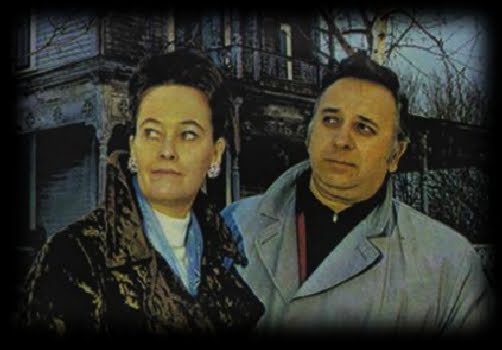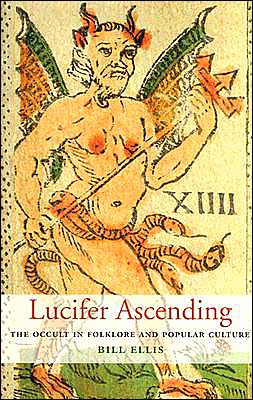 As mentioned in a previous post, The Conjuring has generated a lot of discussion and controversy. One area that has received a lot of attention is its depiction of evil witches and the “darkness of witchcraft” in connection Christian conceptions of Satan and demonology. You can read my previous post, a guest essay by a Pagan writer and film scholar for that perspective in response. There is also a discussion of this at The Wild Hunt blog which raises the important question of what the legacy of this film will be in depictions of real-world Pagans and Christian interactions with them.
As mentioned in a previous post, The Conjuring has generated a lot of discussion and controversy. One area that has received a lot of attention is its depiction of evil witches and the “darkness of witchcraft” in connection Christian conceptions of Satan and demonology. You can read my previous post, a guest essay by a Pagan writer and film scholar for that perspective in response. There is also a discussion of this at The Wild Hunt blog which raises the important question of what the legacy of this film will be in depictions of real-world Pagans and Christian interactions with them.
Another element of the controversy, but one that so far has received little consideration, is that of Ed and Lorraine Warren, self-described demonologists and researchers in the paranormal. Ed is now deceased, but Lorraine continues to make the rounds providing stories about their alleged encounters and adventures. They were involved in the Amityville Horror, and have been involved in horror movies that claim to incorporate their experiences, including not only The Amityville Horror, but also the television movie The Haunted, The Haunting in Connecticut, and now The Conjuring.
But what are we to make of the Warrens? Although they combine elements of their Roman Catholicism with psychic gifts, something that would be frowned upon in orthodox Catholicism, they have successfully combined the paranormal, and now aspects of Paganism, to Christian demonological assumptions. Yes, The Conjuring is a work of fiction, and should be taken with a grain of salt, but the film also claims to be “based upon a true story,” and incorporates the work and testimony of the Warrens. Thus, as the film overlaps with real-world concerns their credibility is important. Critical analysis of their work must be considered, and in light of this Flavorwire published “The Long, Strange Career of ‘The Conjuring’ Demonologists Ed and Lorraine Warren.”
 But more critical analysis is needed. To that end, TheoFantastique has solicited comments on the Warrens from its network that includes those with expertise in relevant disciplines. Earlier today one respondent provided his thoughts, Bill Ellis, an expert in the occult and folklore, and who has researched and written extensively on the topic, including Raising the Devil: Satanism, the New Religions, and the Media (University of Kentucky Press, 2000), and Lucifer Ascending: The Occult in Folklore and Popular Culture (University of Kentucky Press, 2004). Ellis wrote:
But more critical analysis is needed. To that end, TheoFantastique has solicited comments on the Warrens from its network that includes those with expertise in relevant disciplines. Earlier today one respondent provided his thoughts, Bill Ellis, an expert in the occult and folklore, and who has researched and written extensively on the topic, including Raising the Devil: Satanism, the New Religions, and the Media (University of Kentucky Press, 2000), and Lucifer Ascending: The Occult in Folklore and Popular Culture (University of Kentucky Press, 2004). Ellis wrote:
It’s been a long time since I dealt with this, and since my retirement I’ve passed on my satanism files and books to Penn State’s Library collection. I do recall the two as prominent media figures in both the Amityville Horror house and the Smurl haunting case. They tended to focus on demonic obsession as a primary focus in a way that was similar to the approach of the Deliverance Ministry that I discuss in “Raising the Devil.” That is, paranormal events are the work of Satan’s minions, and even trivial experimentation with the occult can lead to serious demonic attacks. Interestingly, Lorraine Warren functioned as a trance medium as part of their investigations, but then exorcism was, notoriously, a form of occult investigation in which interesting things could be learned by questioning indwelling demons, essentially using afflicted individuals as a kind of Ouija board.
In scattered notes, I also find that the Warrens took a very hard line against Ouija boards, holding that they should be burned, sprinkled with holy water (I believe they were either Catholic in orientation or at least swung that way, as Ed also used a crucifix in his work), and then buried. Cabbage Patch dolls also tended to be foci of occult/demonic activities, Warren alleging that such toys, when treated like real human babies, attracted demons as “souls,” allowing them to levitate and speak to their owners, saying things like “I’m not just a doll — I’m the Lord of Hell.” [Reference: Omni Magazine, Feb. 1985. http://textfiles.com/magazines/HUMUS/humus.001]. They too needed to be sprinkled with holy water and buried to avoid further trouble.
While I would not go so far as to call them “fakes,” it is clear that they represented a fringe approach to the paranormal that was essentially an effort to appropriate emerging forms of occult activity into a form of Christianity by defining them as a form of spiritual warfare. Which is, as you know, essentially what the prosecutors of the Salem Witch Trials did in 1692. It is an effort to compete with the neopagan revival (or at least with what Christians thought neopagans were doing) rather than a movement to combat it.
http://textfiles.com/magazines/HUMUS/humus.001
One of my concerns where the Warrens are concerned is found in the final paragraph of Ellis, the work of the Warrens that has confirmed Christian presuppositions about Pagans as being in league with the Devil, and thus a Spiritual Warfare approach is needed, which may or may not involve modified forms of Roman Catholic ritual. Earlier today I read two blog posts by Evangelicals which picked up on precisely these areas and ran with them, only to confirm stereotypes and spread misinformation about Wiccans and Pagans. And then there’s the possibility of bringing additional lack of credibility to the study of the paranormal, a research area that already struggles with legitimacy.
Before we run with the “facts” of the Warrens in confirming our views of witches, Pagans, the Salem Witch Trials, or even the paranormal, let’s do our homework to see what kind of people we’re dealing with and weigh their testimony accordingly.





One Response to “Critical Considerations of “The Conjuring’s” Ed and Lorraine Warren”